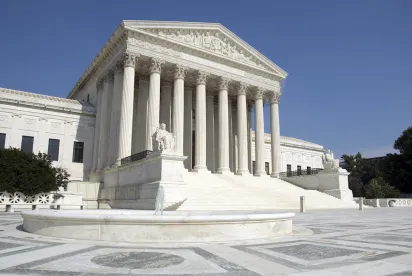In an 8-1 decision, the Supreme Court held in U.S. Patent and Trademark Office v. Booking.com that “generic.com” marks may be registered trademarks or service marks when consumers do not perceive them as generic.
Booking.com is a travel company that provides hotel reservations and other services under the brand “Booking.com,” which is also the domain name of its website. Booking.com filed applications to register four marks in connection with travel-related services, each containing the term “Booking.com.”
A United States Patent and Trademark Office (USPTO) examining attorney and the USPTO’s Trademark Trial and Appeal Board (TTAB) both concluded that the term “Booking.com” is generic for the services at issue and is therefore unregistrable. According to the TTAB, “Booking” means making travel reservations and “.com” signifies a commercial website. The TTAB ruled that customers would understand the term “Booking.com” primarily to refer to an online reservation service for travel, tours, and lodging. Alternatively, the TTAB held that even if “Booking.com” is descriptive, it is unregistrable because it lacks secondary meaning.
Booking.com sought review in the US District Court for the Eastern District of Virginia. Relying in significant part on new evidence of consumer perception, the district court concluded that “Booking.com”—unlike “booking”—is not generic. The “consuming public,” the court found, “primarily understands that BOOKING.COM does not refer to a genus, rather it is descriptive of services involving ‘booking’ available at that domain name.” The Court of Appeals for the Fourth Circuit affirmed the district court’s judgment.
During oral argument at the Supreme Court, the USPTO argued that the combination of a generic word and a “.com” must also be generic. The Court rejected this per se theory, ruling that whether “Booking.com” is generic turns on whether that term, taken as a whole, signifies to consumers the class of online hotel reservation services. According to the Court, if “Booking.com” were generic, one might expect consumers to understand Travelocity—another such service—to be a “Booking.com.” Additionally, one might similarly expect that a consumer, searching for a trusted source of online hotel reservation services, could ask a frequent traveler to name her favorite “Booking.com” provider. However, as noted even by the USPTO and the dissent, only one entity can occupy a particular Internet domain name at a time, so a “consumer who is familiar with that aspect of the domain-name system can infer that BOOKING.COM refers to some specific entity.”
The Court further opined that the USPTO’s fears that trademark protection for “Booking.com” could exclude or inhibit competitors from using the term “booking” or adopting domain names like “ebooking.com” or “hotel-booking.com” are unfounded. According to the Court, this is an issue for any descriptive mark and comes down to a likelihood of confusion analysis.
Justice Sotomayor’s Concurrence
In a concurring opinion, Justice Sotomayor agreed that there is no per se rule against trademark protection for a “generic.com” mark. However, she cautioned the use of surveys as they can have limited probative value depending on the survey design.
Justice Breyer’s Sole Dissent
Justice Stephen Breyer, the sole dissenting justice, argued that the majority disregarded important trademark principles and sound trademark policy. According to Justice Breyer, “[t]erms that merely convey the nature of the producer’s business should remain free for all to use.” Thus, under the majority’s approach, many businesses could obtain a trademark by adding “.com” to the generic names of their products, which Justice Breyer claimed could have widespread anticompetitive effects, and the majority’s reliance on the need to prove confusion and the statutory descriptive use privilege to protect competitors, underestimates the threat of costly litigation.
Implications
The decision in Booking.com expands trademark protection for seemingly generic marks simply by adding “.com” to the mark. A registrant need only rely on the consumer’s perception of the mark, which can be shown by the use of surveys. Thus, even with Justice Sotomayor’s caution against the use of surveys, surveys are likely to become more important during the registration process and in any subsequent litigation.





 />i
/>i

